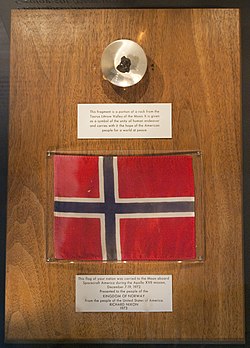Apollo 17 lunar sample display

The Apollo 17 lunar sample display consists of a Moon rock fragment from a lava Moon stone identified as lunar basalt 70017, the recipient's flag and two small metal plates attached with descriptive messages. A goodwill gift from the Apollo 17 mission was then given by President Richard Nixon in the form of a wooden commemorative plaque display to all fifty U.S. states and U.S. territories, and 135 nations worldwide.
Collection
Eugene Cernan and Harrison Schmitt ended their walk on the Moon in 1972 with a dedication to the young people of Earth and a desire that all "live in peace and harmony in the future". They expressed hope that distribution of pieces of the rock they had collected would bring this worldwide peace and goodwill.
Description

The sample Moon rock collected during the Apollo 17 mission was later named lunar basalt 70017, and dubbed the Goodwill rock. Pieces of the rock weighing about 1.14 grams were placed inside a piece of acrylic lucite, and mounted, along with a flag of the country which would receive it, that had flown on Apollo 17.
In 1973 Nixon had the plaques sent to 135 countries, and to the United States with its territories, as a goodwill gesture. They were presented with a letter from Nixon, stating that:
Fate
The New York Times reported in 2012 that gifts of moon rocks were not well tracked or managed by NASA. Within the US, public gifts require legislation to be transferred, but other nations set their own laws. Some samples of lunar dust soil from the earlier Apollo 11 and samples from the Apollo 17 missions have been reported missing. Since 2005 entities and people have made concerted efforts to find the displays. Joseph Gutheinz, a former NASA Office of Inspector General special agent and a professor who teaches an online course at the University of Phoenix, had his students try to locate the displays. Robert Pearlman of collectSPACE has also tracked the displays.
- Alabama display
- Georgia display
- Massachusetts display
- United Kingdom display
- Indiana display
- New Hampshire display
- Austria display
- Arizona display
- Colorado display
- Rhode Island display
- Tennessee display
- Sweden display
See also
References
Further reading
- Millett, Lucy (September 17, 2009). "Moon rocks went missing around the world". Cyprus: Cyprus Mail. Retrieved November 3, 2012.











